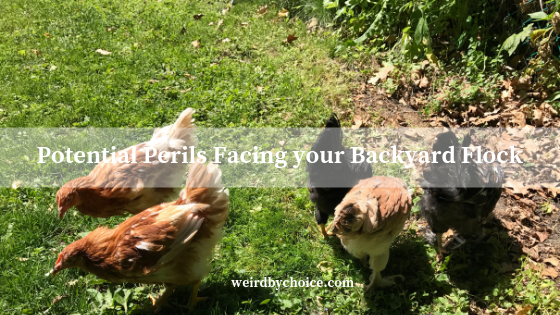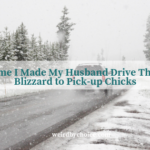You guys know how much I love my chickens, right?! We have enjoyed a small backyard flock for the past year and it has been educational, rewarding and full of love, but it has not been without difficulty and sadness. I decided it was time to document some of the troubles we’ve faced along the way in the hopes of helping you avoid similar issues with your backyard flock.
I apologize if this post is a little gross for the more squeamish among us. Raising animals isn’t always glamorous, but I am hoping by sharing I can be a help to others.
Peril #1: Neighborhood Predators
Raising a backyard flock may make you less susceptible (or at least feel less susceptible) to the issues faced by your rural, larger-flocked counterparts. You may not have to worry quite as much about wild animals like raccoons, foxes, mink and other critters who can wreak havoc on your coop, but your chickens are still very much in danger. Last summer, we lost four of our original six to a neighborhood dog who pushed through our run and killed the girls seemingly just for sport. One hen escaped and my precious Salmon Favorolles rooster, Peepers, was dragged two blocks and left for dead.
This afternoon, I came home from a few hours of running errands and found my current four hens dead in the run. My run was bent a bit of one side, but it’s hard to tell if it was the same dog or something else. Either way, it looks like they were once again killed purely for sport, as they were not eaten.
Lesson Learned: You must fortify your run. Our was made of small posts and chicken wire and was simply not strong enough to withstand an attack from a large animal. We had intended to strengthen it this spring, but unfortunately did not do so in time. Don’t forget about aerial attacks as well; birds of prey can easily make a meal of your gals.

Peril #2: Illness
After our first batch of hens were lost to the neighborhood dog, I wasn’t ready to throw in the towel and found a large farm raising and selling dozens of chicken breeds about an hour from my home. The barn and enclosures were overflowing with chickens of all different ages and types, and while it seemed a little bit like an episode of Hoarders: Farm Edition to me, I assumed this seemingly knowledgeable woman knew what she was doing. We brought home a few unique breeds like a beautiful Lavender Orphington and Red and Blue Laced Wyandotte. Unfortunately by the next day, we noticed runny noses and bubbly eyes in a few of the new hens. We exchanged the sick birds at the same farm, but experienced similar symptoms with the second batch. I tried a few home remedies I found on chicken message boards – Vicks, electrolytes, and even Thieves essential oils, but they never regained their health.
Lesson Learned: Pay attention to the conditions in which your chicks or chickens were initially kept and follow your gut. I know commercial hatcheries often take heat simply because they are “commercial” but we have purchased 12 chicks from Tractor Supply (who is supplied by Hoover’s Hatchery) and all have grown into healthy adults.
Peril #3: Prolapse
Near the end of the winter I lost two hens to prolapse (one Silver-Laced Wyandotte and one ISA Brown) within about two weeks of each other. Prolapse is a condition in which a large egg can be difficult for a chicken to pass. Sometimes the egg can actually become stuck, but other times it passes causing the vent to turn itself partially inside out. This issue can sometimes cause the healthy birds to peck at the injury of their weakened sister, making the issue much worse and ultimately killing the bird. You can find several suggestions online for dealing with prolapse, but our hens succumbed so quickly there was nothing we could do.
Lesson Learned: If you have hens laying large eggs you’ll want to keep an eye out for any blood on the eggs themselves, or try to do quick vent checks with your girls, just to make sure everything looks healthy. If you notice a chicken showing signs of prolapse, you’ll want to separate her from the others immediately until the issue can be resolved.

Sigh…So, as of right now we’re a chickenless family. I miss our girls already, but am so grateful for the joy they brought to our home over the last year.





